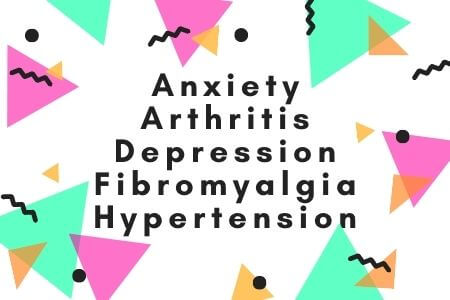- Home
- Associated Conditions
- Migraines and Gluten
Migraines and Gluten Intolerance.
Can Gluten Trigger an Attack?
A simple blood test for migraines and gluten intolerance or full blown Celiac disease may mean the difference between heaven and hell for you. Did you know that migraines can be triggered by gluten in foods?
My #1 Choice in Magnesium Supplementation
Migraines and Gluten - What You'll Learn in This Article:
Can gluten cause a migraine attack? YES, it can... in some people.
Dr. Alex Mauskop says that he has had a number of patients reduce their headaches using a gluten-free diet. [3]
He cited a study from BMC Medicine that showed that gluten sensitive participants, even though they did not have the antibodies associated with Celiac Disease, and had normal biopsies, still had signs of an immune reaction in their blood.
I have been led to believe that being gluten sensitive is not real. But in this study the participants improved greatly on a gluten free diet and experienced similar symptoms to the full-blown disease when gluten was introduced again.
I think if you are experiencing chronic migraines or even just regular headaches, or these symptoms: bloating, diarrhea, constipation, fatigue and mental/brain fog, then it may be worth trying a gluten free diet.
Another recent study showed that migraines are more common in people with Celiac disease. Migraines and gluten intolerance can also be a problem, even if the antibodies aren’t attacking your intestines.
However, this study said that even over a number of years of being on a gluten free diet, there was no influence on severity of migraines (Celiac.com). It did not mention frequency or duration. I do know that I have been gluten free for several years now and it did not make a difference to my migraine attacks at all, on any level.
I did notice a huge increase in energy levels after removing gluten from my diet. My symptoms reduced, but it took a few years. But I won’t bore you with that.
Let’s just talk about migraines and gluten.

The Connection Between Migraines and Gluten
Studies do show that gluten may be a trigger for migraines in some of us. A recent study [5] has suggested a link between celiac disease and migraines. Migraines may even be an early symptom of celiac disease in some people, though migraine is considered a rare complication of celiac disease. [4]
Gluten can affect the nervous system in people with celiac disease and people with non-celiac gluten intolerance. Here are a few examples of conditions that affect the nervous system:
- learning disorders
- depression
- migraine
- headache
This means that gluten could trigger a migraine for you even if you don’t have celiac disease but instead have an intolerance or sensitivity to gluten. Gluten sensitivity isn’t well understood yet. If you have gluten sensitivity, here are a few things you might experience:
- foggy thinking
- abdominal pain
- gastrointestinal symptoms, like diarrhea or constipation
- a headache
- joint pains
- bloating
- chronic fatigue
So… it’s true that gluten could be a trigger for you if you get a lot of migraines, but (as most studies say) “more research is necessary to understand this connection.” [4]
What is gluten and why is it bad for you?
Gluten can trigger an autoimmune response that attacks the lining of the small intestine in some people. As a result, the body can no longer absorb nutrients into the bloodstream properly. This leads to anemia, delayed growth, and weight loss, among other things.
~ Medical news Today
What Exactly Is Gluten?
According to the Celiac Disease Foundation...
"Gluten is a general name for the proteins found in wheat (wheat berries, durum, emmer, semolina, spelt, farina, farro, graham, KAMUT® khorasan wheat and einkorn), rye, barley and triticale (a cross between wheat and rye). Gluten helps foods maintain their shape, acting as a glue that holds food together." [7]
And don't forget bread wheat flour! All-purpose flour, whole wheat flour, cake flour, and self-rising flour.
The Main 4 Culprits To Stay Away From
People with gluten intolerance or more extreme, Celiac disease, have trouble digesting gluten containing foods such as:

• Wheat
• Barley
• Rye
• Oats (this one is being debated)
According to Dr. Rizzoli, et al authors of the The Migraine Solution, “Gluten can also be found in: medicines, vitamins, and even the glue on stamps and envelopes. When those with the disease eat foods with gluten, their immune system responds by causing damage to the small intestine.
Symptoms vary, but scientists are beginning to think it may cause headaches that can mimic migraine or aggravate migraine in those who already have them. For example, one Italian study that followed 90 migraine sufferers determined that four had Celiac disease and had those subjects follow a gluten-free diet for six months.
During this time, one of the four patients had no migraine attacks, and the remaining three patients experienced an improvement in frequency, duration and intensity of migraines” (Rizzoli, 2011, p. 182).
Migraines can be triggered from gluten intolerance or gluten sensitivity without the full blown immunological response or intestinal changes of Celiac disease. If you notice your migraines being triggered by any food that has gluten in it, it would be worth getting the blood test to see if you have Celiac disease (ibid.).
Hidden Gluten - Yes! It Can Hide in Plain Sight
Gluten is contained in some less obvious foods, like:
- Food additives – modified food starch or malt flavoring
- Medications
- Herbal supplements
- Vitamins
- Lipstick (this one surprised me)
- Postage Stamps (this one surprised me too!)
- Lunch meats – cold cuts
- Soups
- Gravies
- Stews
- Hard candies and soft candies (Licorice, marshmallows or jellybeans)
- Soy Sauce (a common one)
Two other resources that I trust, and you can find more information and a detailed list of foods that contain gluten are on the Celiac Disease Foundation website and the Mayo Clinic website.
It might help to test out an elimination diet.
Avoid packaged products that contain these ingredients, which are "code words" for gluten:
Amino peptide complex, Avena Sativa, brown rice syrup, Carmel color (frequently made form barley), cyclodextrin, dextrin, fermented grain extract, Hordeum distichon, Hordeum vulgare, hydrolysate, hydrolysed malt extract, hydrolysed vegetable protein, maltodextrin, modified food starch, natural flavoring, phytosphingosine extract, Secale cereale, soy protein, Triticum aestivum, Triticum vulgare, hydrolized vegetable protein (HVP), yeast extract.
~ The Grain Brain Cookbook by David Perlmutter (pg. 24)
The Best Ways to Avoid Gluten
The best way to avoid migraines and gluten in foods is to get used of reading your food labels.
Someone once said to me, if you even have to read the label, you should not be eating it.
Meaning, eat fresh food, home cooked meat and vegetables and you can’t go wrong.
You can always phone the food manufacturers is you want more information on the product.
Cross contamination can be important. This means that a knife used to cut normal bread should not be used without a thorough wash with hot soap and water, before cutting you gluten free bread. Or washing the cutting board off before you cut up your veggies.
I found this a necessity at first, when I was becoming gluten free. My ‘allergic’ reactions were severe. But now, some 8 years later, I can use the same toaster as my husband, but not the same cutting boards.
Be very clear if you are going over to a friends for dinner, or out for dinner. We are lucky now a days, there seems to always be gluten free food on menus. If there is not, be sure to ask, so that they get the hint for the future. If they want your return business that is!
Ask your pharmacist about your medications, herbs and supplements. I have noticed that many supplements now actually say gluten free if they are. Back to reading the labels.
Here Are Some 'Safe' Foods
Anything that says gluten free (GF) should be a safe food to eat. Although, I must say I find many GF things high in sugar. So you might need to read your labels closely.
- Fresh meat: fish, chicken, lamb, turkey, beef (i.e. steak). Anything that is NOT marinated.
- Some dairy products are safe for some individuals
- All fruit is safe
- All vegetables are safe
- Grains: rice (white, brown), millet, quinoa, amaranth, buckwheat, sorghum, teff and wild rice (it's not technically a grain).
- Gluten free flours made from: amaranth, almond (if not allergic to nuts), rice, soy, chickpeas, coconut, buckwheat, potato, corn.
Migraines and Gluten - In My Experience
I could not pinpoint gluten as one of my migraine triggers. But as I said, my energy levels picked up enormously once I stopped eating gluten. And then of course there was the blood test to confirm it. My doctor said she did not know how it could have been overlooked for so many years.
There is also some strong evidence that dairy products may create a similar reaction in the blood, even if you are not lactose intolerant. So once you trial gluten, you might want to eliminate dairy products and see if that has any effect on your migraines.
Always remember to keep a migraine diary when you are trying new things, so you can clearly see the results and have something to show your doctor.
Until next time, be well, and may your toughest days be met with comfort and care. Keep going - you are stronger than you know.
~ Holly, Migraine Savvy
Ready to take the next step?
Choose the next step that fits where you are right now.
ASSOCIATED CONDITIONS Related Articles
Migraines and Gluten References:
1. Rizzoli, P MD, Loder E., MD and Neporent L. (2011) The Migraine Solution: A Complete Guide to Diagnosis, Treatment and Pain Management. St. Martins Press: NY. (pp.182-183).
2. Bioconcepts (2012) Celiac Disease. Available [Online] at: http://bio.health.naturalstandard.com/index-abstract.asp?create-abstract=condition-celiac.asp&title=Celiac%20disease. Accessed July 11, 2013.
3. Mauskop, A. MD (2011) Gluten Sensitivity and Migraines. Available [Online] at: http://migraine.com/blog/gluten-sensitivity-and-migraines Accessed July 25, 2013 - updated 2024.
4. Healthline (2016) is Gluten Triggering Your Migraines? Available [online] at: https://www.healthline.com/health/migraine/migraines-and-gluten. Accessed Feb. 2020
5. PubMed (2013) Prevalence of migraine in patients with celiac disease and inflammatory bowel disease. Available [online] at: https://www.ncbi.nlm.nih.gov/pubmed/23126519. Accessed Feb. 2020
6. Medical news Today (2018) Is a gluten free diet good for your health? Available [online] at: https://www.medicalnewstoday.com/articles/288406.php. Accessed Feb. 2020
7. Celiac Disease Foundation (2020) What is gluten? Available [online] at: https://celiac.org/gluten-free-living/what-is-gluten/. Accessed Feb. 2020
Migraines and Gluten updated Aug. 21, 2024











